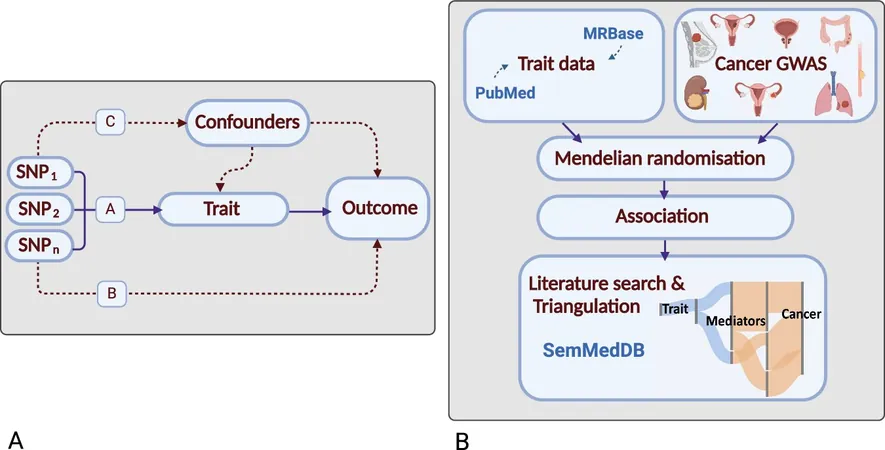
Groundbreaking Research Unveils New Cancer Risk Factors - Are You at Risk?
2024-09-26
Introduction
In a landmark study, researchers from The Institute of Cancer Research, London, have explored thousands of genetically determined traits to uncover causal relationships linked to eight prevalent cancers. By analyzing data from over 860,000 individuals, the team identified critical risk factors for breast, bowel, endometrial, lung, esophageal, ovarian, prostate, and kidney cancers.
Key Findings
The findings reaffirm well-known risk factors including obesity and smoking, highlighting the urgent need for public health initiatives aimed at reducing cancer incidence across populations. In addition to confirming these established risks, the study has also shed light on less recognized traits that could potentially elevate cancer risks.
Study Details
Published in the journal *Nature Communications*, the research delves into datasets comprising 378,142 cancer cases and 485,715 cancer-free individuals. The team identified a staggering 336,191 genetic variants associated with a total of 3,661 traits, grouping them into categories linked to cancer risk, such as dietary habits and metabolic factors.
Research Methodology
The researchers employed a rigorous statistical approach to evaluate associations between these traits and the cancers studied. They used a grading system based on statistical significance, labeling relationships as “robust,” “probable,” “suggestive,” or “non-significant.” Notably, the strongest connections were found with endometrial cancer, while ovarian cancer exhibited the least number of robust associations.
Confirmed Risk Factors
Among the many findings, the analysis confirmed that smoking is a major risk factor for lung cancer. It also established links between elevated body mass index (BMI) and increased risks for colorectal, endometrial, lung, ovarian, and renal cancers, as well as highlighting significant correlations between alcohol consumption and multiple cancer types. Sedentary lifestyles were also shown to amplify risks for various cancers, including breast and colorectal cancers.
Novel Insights
In a surprising twist, the study unveiled previously unexamined connections involving hormonal factors and genetic markers influencing vitamin and mineral levels, like vitamin B12 and zinc. Particularly intriguing was the discovery of a genetic marker linked to a type of white blood cell that was associated with six of the cancer types studied.
Innovative Approach
The researchers utilized an innovative approach known as Mendelian randomization phenome-wide association study (MR-PheWAS), which helps clarify relationships between traits and cancer risks by leveraging genetic data, thereby minimizing the confusion caused by reverse causation.
Expert Insights
Lead author Dr. Molly Went emphasized the breadth of this approach: "By not bound by a specific hypothesis, we could investigate a vast array of traits and uncover novel associations that might have been overlooked." Senior author Professor Richard Houlston commented on the complexity of analyzing dietary data, noting that their extensive dataset and methodology provide strong evidence that the associations are not mere chance.
Conclusion
As these findings make their way into the scientific community, the hope is that they will inspire further research into molecular markers of cancer risk. The study’s ultimate goal is to identify potential biomarkers that could enhance early detection and prevention strategies, potentially saving countless lives.
Call to Action
Cancer remains one of the leading causes of death globally, and as we uncover more about the factors influencing its risk, we move closer to developing effective interventions. Stay informed and proactive about your health—are you aware of your cancer risk factors? Share your thoughts below!


 Brasil (PT)
Brasil (PT)
 Canada (EN)
Canada (EN)
 Chile (ES)
Chile (ES)
 España (ES)
España (ES)
 France (FR)
France (FR)
 Hong Kong (EN)
Hong Kong (EN)
 Italia (IT)
Italia (IT)
 日本 (JA)
日本 (JA)
 Magyarország (HU)
Magyarország (HU)
 Norge (NO)
Norge (NO)
 Polska (PL)
Polska (PL)
 Schweiz (DE)
Schweiz (DE)
 Singapore (EN)
Singapore (EN)
 Sverige (SV)
Sverige (SV)
 Suomi (FI)
Suomi (FI)
 Türkiye (TR)
Türkiye (TR)